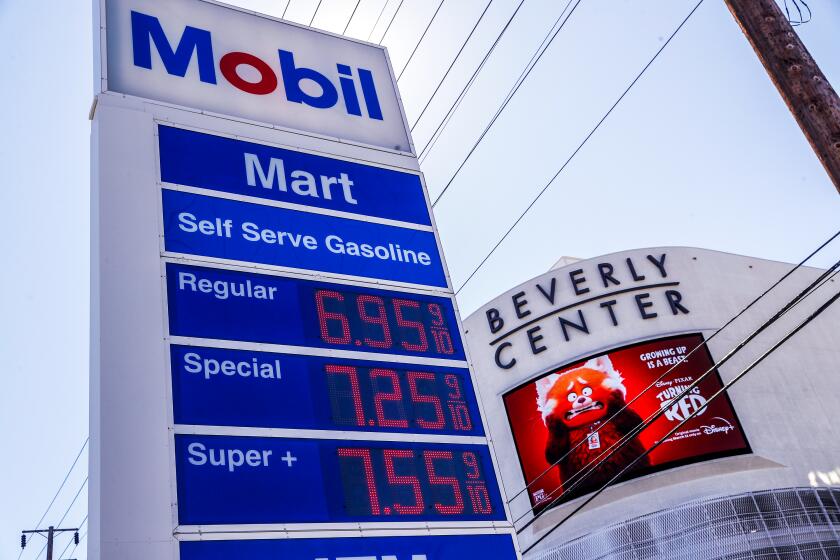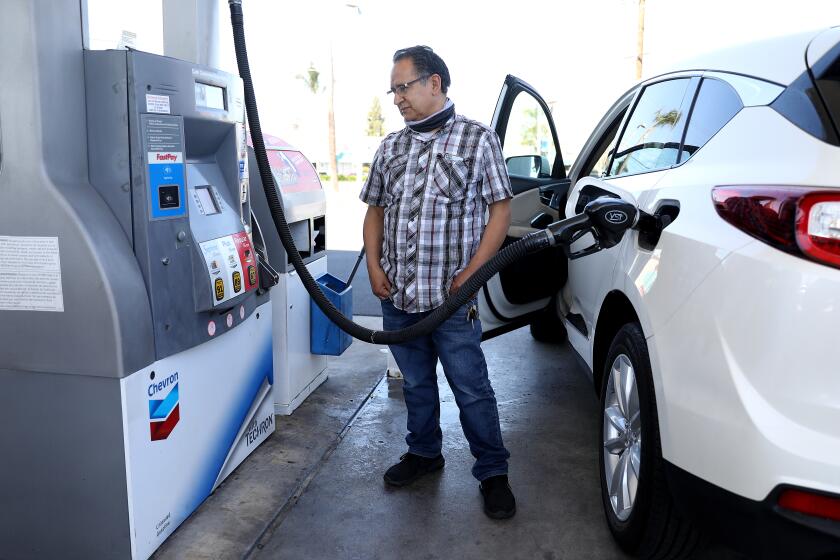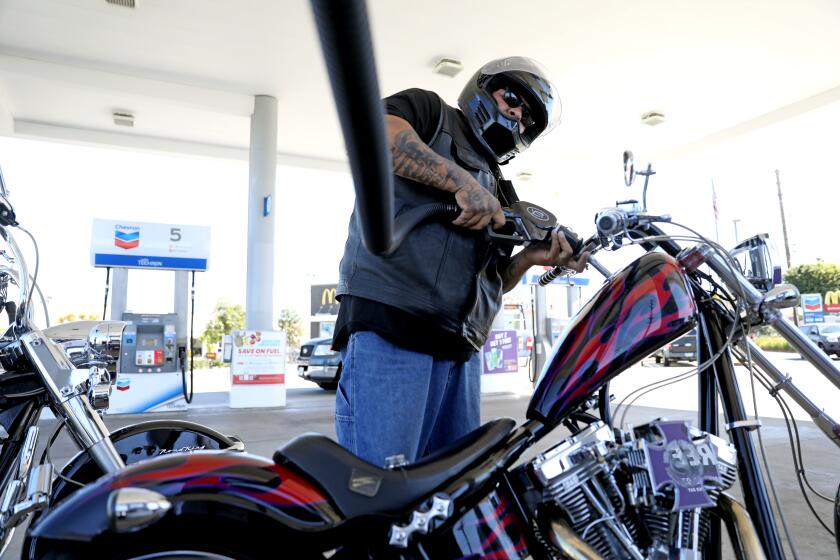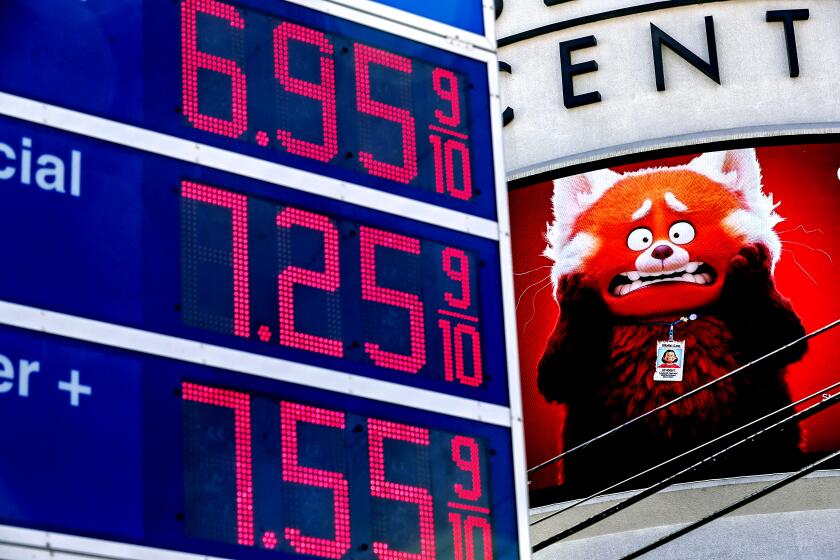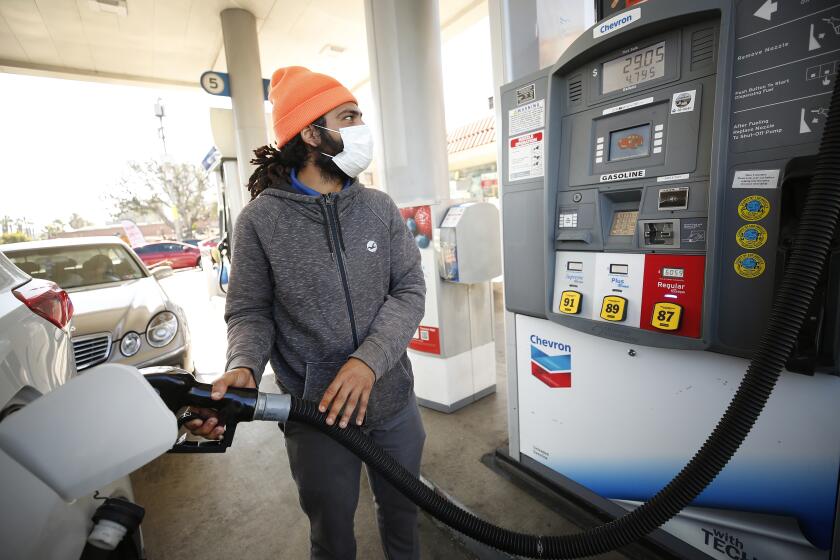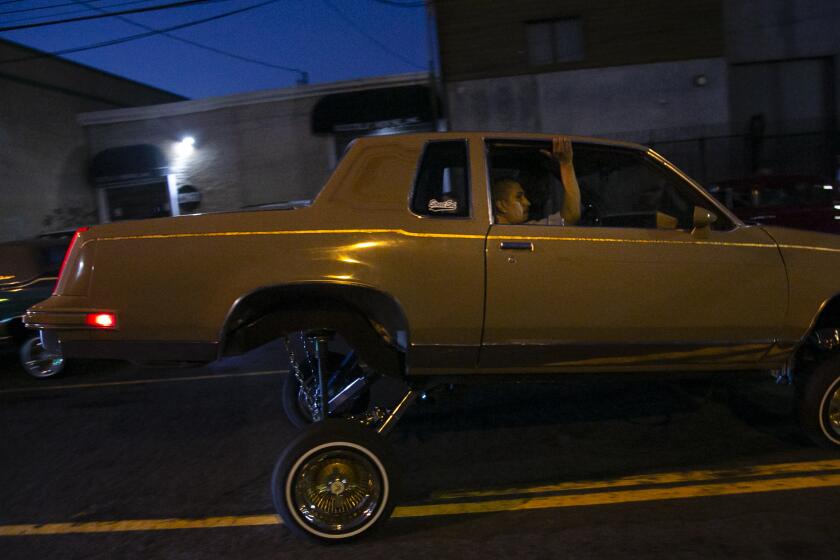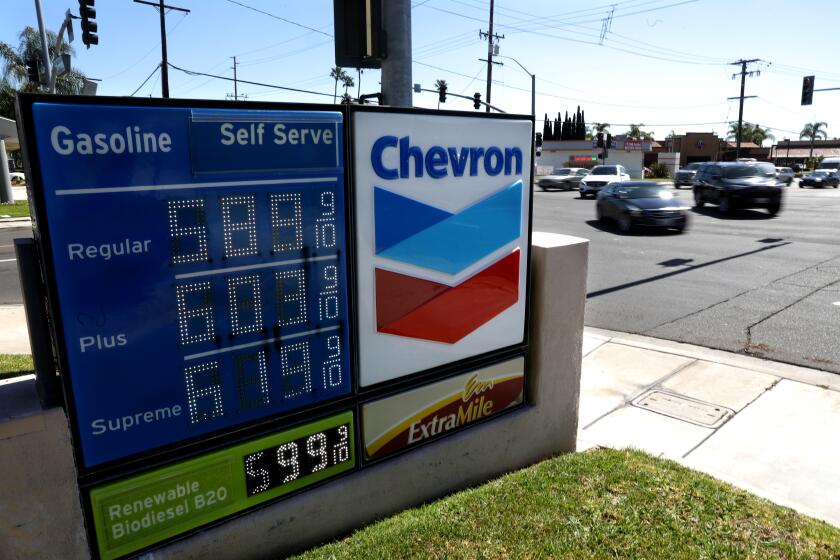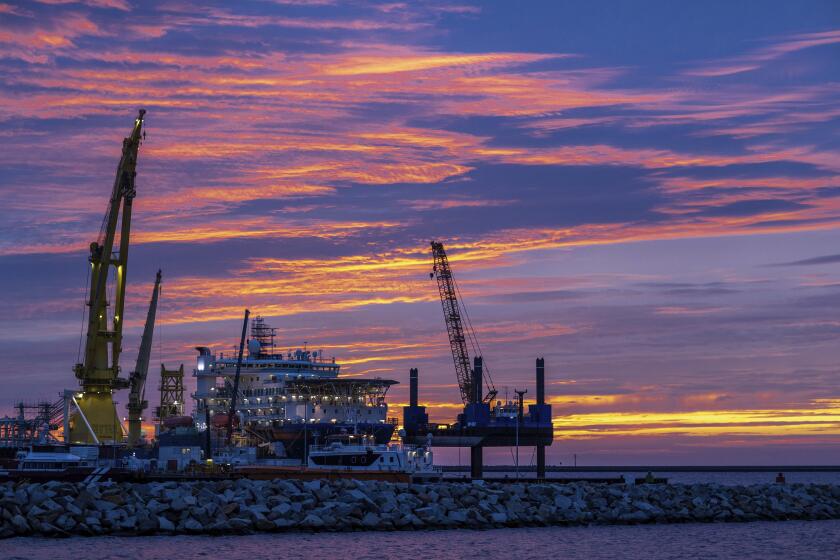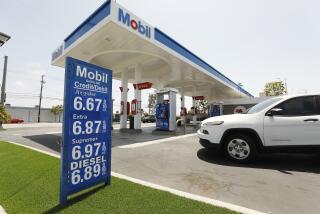How Californians are getting around high gas prices (or at least trying)
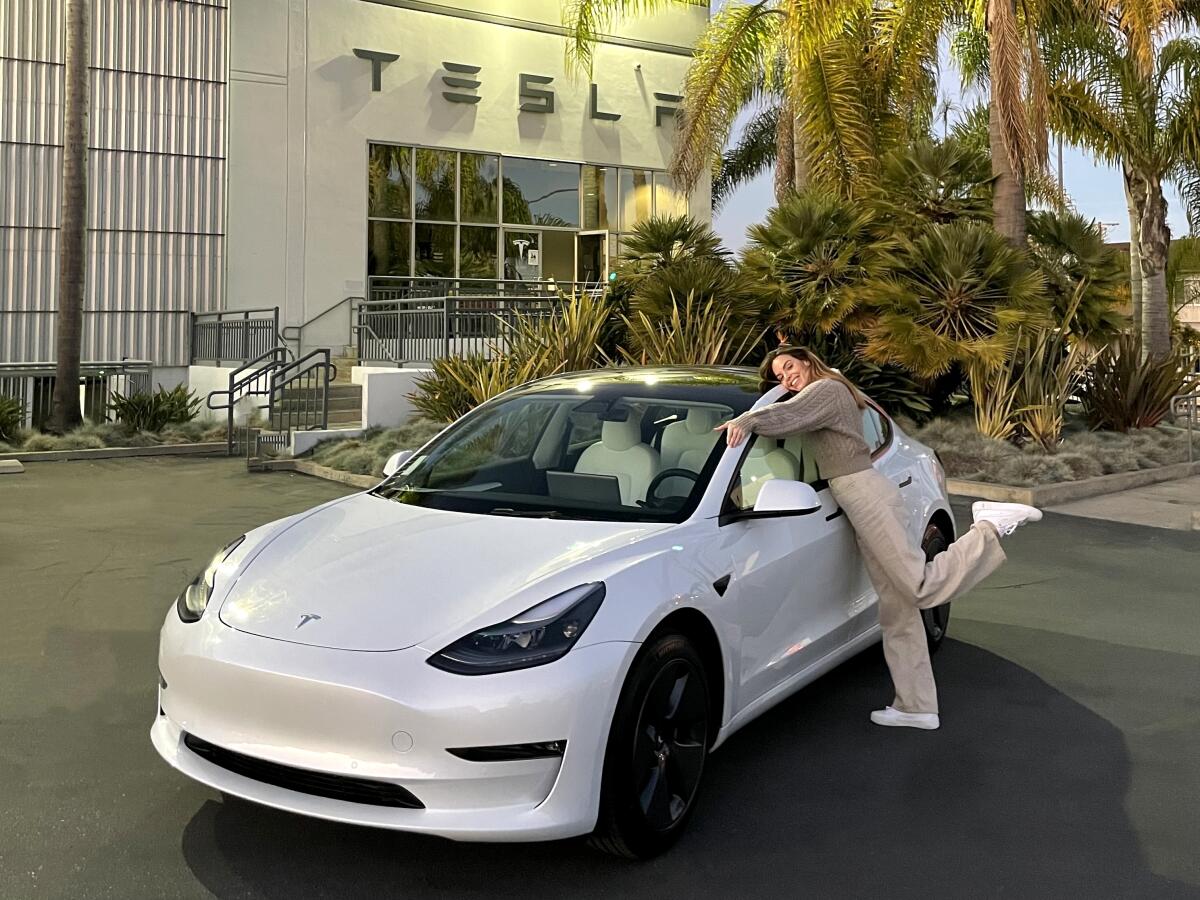
- Share via
Gasoline prices have soared at the worst time: Commuters are beginning to return to offices that some haven’t seen in two years, and record-hot inflation is increasing prices for many essentials.
For some people, it’s one more headache, straining budgets and fraying nerves.
Others are relieved that they’ve given up their gasoline habit for bike commuting and alternative fuel vehicles. (Good luck finding a hybrid or electric vehicle, whether new or used. Prices are high, and supplies are tight.)
Regular-grade gasoline at some California service stations has topped $7 a gallon. And unlike most past price surges, this one could last for months because of Russia’s war on Ukraine, which has further destabilized a volatile energy market.
The Times interviewed eight Angelenos to find out how their lives have been changed by the new fuel-price normal, and how they are adapting. The interviews have been edited for length and clarity.
You’ve seen the signs advertising $6.95, $6.99 or even $7.05 for a gallon of regular unleaded. But who’s buying it, and why?
Ariana Escalante, 34, owns a marketing and video production company called Vydeomedia.com. Transportation: Tesla Model 3 long range.
I think just the experience of getting gas has always felt a little yucky, a little dirty. It smells bad and sometimes it drips on your shoes. I was like, “Oh, you know what? I don’t think I would miss that.” I thought that Tesla was totally inaccessible. And I’m just like a regular working-class person, but then when I actually looked at the cost comparisons, it made tons of sense.
So, I decided to buy one new. I put in my deposit in November and I got delivery of the car in February. My car gets 358 miles on a charge. I think the Hyundai Sonata I drove for 10 years was around 360 or 370 miles per tank. So, almost an exact match.
I live in an apartment and there isn’t currently any EV charging infrastructure in our building. So far it’s been really easy for me, especially on the Tesla charging infrastructure. So, I’ve just been charging it once on the weekend and that gets me all charged up for the whole week.
At my company we create marketing videos for our clients. My commute is unique in that I don’t have to drive every day, but some days it’s very long drives, like 60 miles. At these gasoline prices I’m probably saving at least $50 a week. Getting my car was very timely. It just feels awesome to not have to worry about fuel prices, to just pass right by a gas station. And unless I wanted to stop in for a bag of chips or a soda, there’s no reason that I’ll ever have to stop at a gas station again.
Gas prices are high across California, and it’s unclear when prices will go down. But, there are ways to save money on gas. Here are some tips.
Ben Valdez, 45, an IT technician and Uber driver. He was driving every day for Uber but has cut back to one day, partly because of gas prices. Transportation: Kia Telluride.
I’m spending most of my work hours as a computer tech for a community college. Since 2015, I’ve experienced maybe three pay cuts, or at least variants of ways that Uber and Lyft have dropped the compensation rates. I just recently purchased the Telluride so I could take more passengers, but I moved from a 50-miles-a-gallon Prius to a vehicle that gets 20 miles to the gallon.
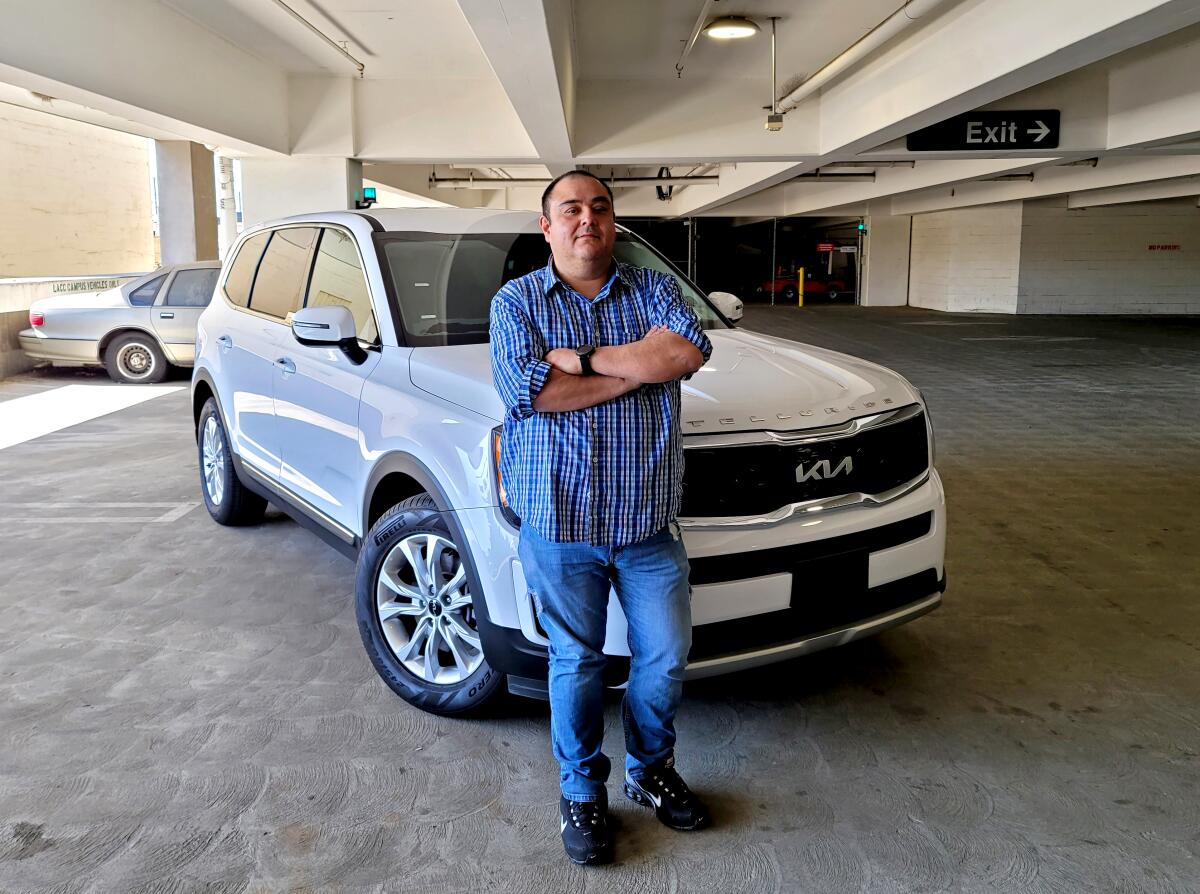
When I started, I think I was making close to about $1 per mile. Now, it’s 60 cents a mile. We’re still considered independent contractors. There is no opportunity as an independent contractor to negotiate any type of rate. I’ve been working with Rideshare Drivers United in fighting for fair wages and protections for drivers.
These are definitely some record-breaking fuel prices. It would typically cost me $60 to $90 to fill up my tank. At this point I’m looking at about $120 to fill up.
Since now I’m fortunate enough to be able to do it part-time, I will only drive when it makes sense. So for me, that means holidays, large events, stuff like basketball games, football games, where there’s going to be high demand. If there is no demand, no surge, I won’t move it. It just doesn’t make any sense to do it.
Here are 30 gas stations in Southern California with low prices right now
Marvin Brooks Jr., 21, is a psychology major at Cal State Long Beach and a guest services representative at Crypto.com Arena. Transportation: 2008 Lexus GS 350, requiring premium gasoline. He recently became a father.
I’m driving about 260 miles a week. I see my son two or three times a week. That drive to Santa Ana is 20 miles. I work five days a week at the Crypto Arena. That’s another 20 miles from my house. When I go to school from home, it’s seven miles. It’s been harder with the gas prices going up because I can’t go to the places that help me keep my head clear.
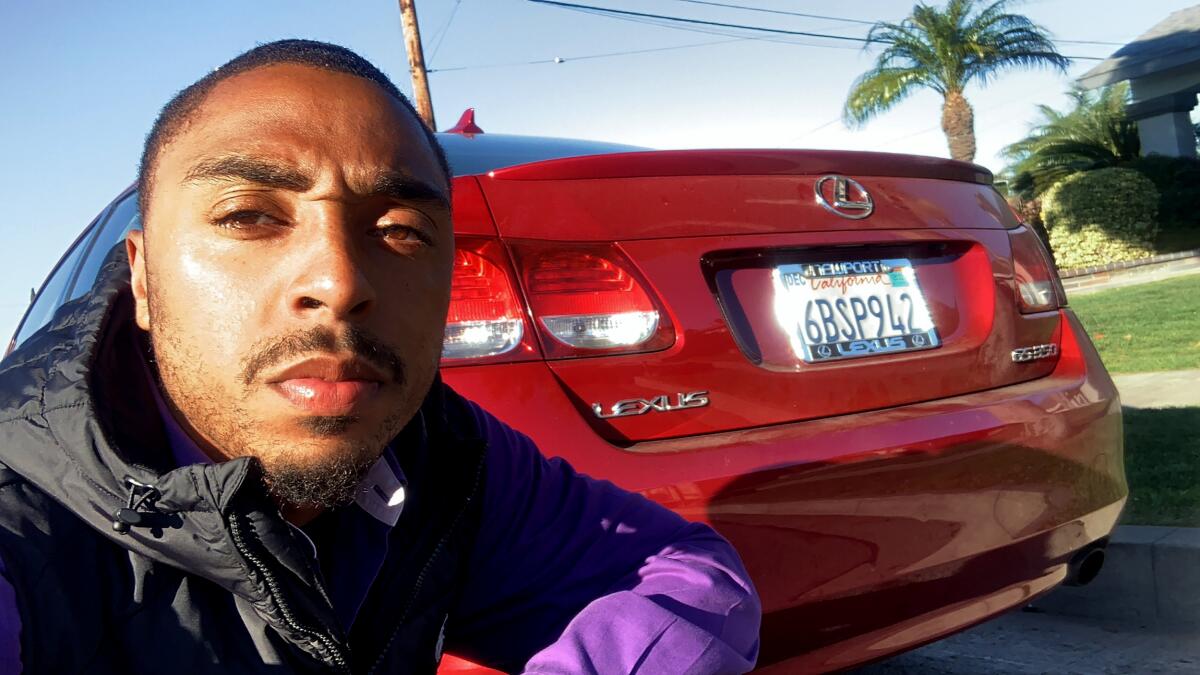
When I learned I was going to have a son, I didn’t really have a plan. I wasn’t really sure which direction I would go. So I would drive out to nature parks, drive to the beaches, just to be alone, clear my head and just create a plan and to keep myself levelheaded. That really helped me find a little tranquility in L.A.
It’s made me a little sad because I do have to think, “OK. So I’m working this many times a week. My son needs this.” So I’m sacrificing what I do for myself. Whatever needs to be done, that’s what I’ll do. So if I have to just take a little bit less time for myself, that’s what I’ll do.
My friends ask me why I’m not overwhelmed. “You have a son, you’re going to school, you’re working, doing all this driving.” But one of my biggest inspirations was Nipsey Hussle, and something he said about adjusting to the game and knowing how the game is going to test you. So I’m just trying to see everything that’s positive in my life. And even with the gas prices, I’m still managing. I’m still keeping a positive spirit and hoping for the days that the prices go back down so I can drive around L.A. like I like to.
Switching to electric cars would slash emissions and deal a blow to Vladimir Putin.
Charley McLean, 38, works for a major entertainment firm in streaming content distribution. Transportation: 2021 Mazda CX-5. He’s also a new dad.
When the pandemic started, one of the things you didn’t have to pay for was gas. That expense went down 90%. To be able to put that money away before we had the baby was a great thing. Starting next week, I will be commuting three days a week, with the goal of going back to pre-pandemic schedules. For me, that’s five days a week, Monday through Friday.
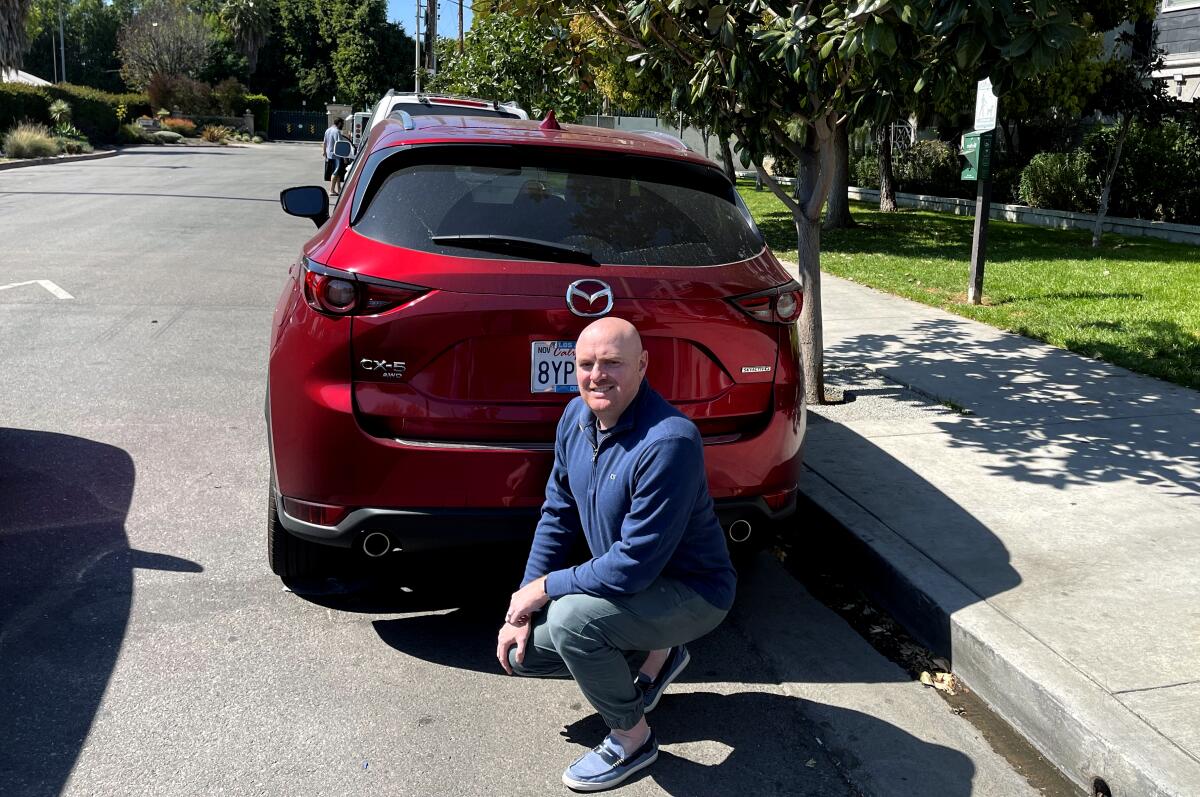
With these gas prices, it’s terrible timing with people going back to their offices.
I thought about electric cars when I was looking in November, but those vehicles were so much more expensive. Ultimately, I didn’t want to do that. I’m on a lease. I can swap out after three years. That plays into the discussion as well. I’m looking at this a little differently. We don’t have a whole lot to complain about. My job is pretty pandemic proof. No one is firing missiles at us. No one is shooting at us. That feels pretty good comparatively. I’m grateful for that.
Sometimes, it feels a bit like the stock market. Both the price and the speed at which gas has shot up is amazing. I mean, it’s only going to go higher. How can it not just continue to go higher? The Russia-Ukraine situation is not going away tomorrow. Inflation is throwing a wet blanket on everything we do, everything we buy, not just at the pump. But like I said, I’m not being shot at.
Gasoline prices depend on global supply and demand, which has been out of whack since the pandemic started. California drivers pay a premium for special blends.
Adam Lasky, 52, works at Helen’s bike shop in Santa Monica, a 22-mile round-trip commute. Transportation: primarily a carbon fiber Trek Domane bike. Resting heart rate: 55 beats per minute.
I ride 110 miles a week, but that’s just the five-days-a-week job commute. On my days off, I ride for pleasure, for about 40 to 60 miles. I’ve been doing this pretty consistently since 2001. Reducing emissions is part of it, but honestly, the biggest part of it are health reasons. To me, if your health is good, you just reduce your carbon footprint in general. I do drive occasionally, when it’s windy or when it’s raining.
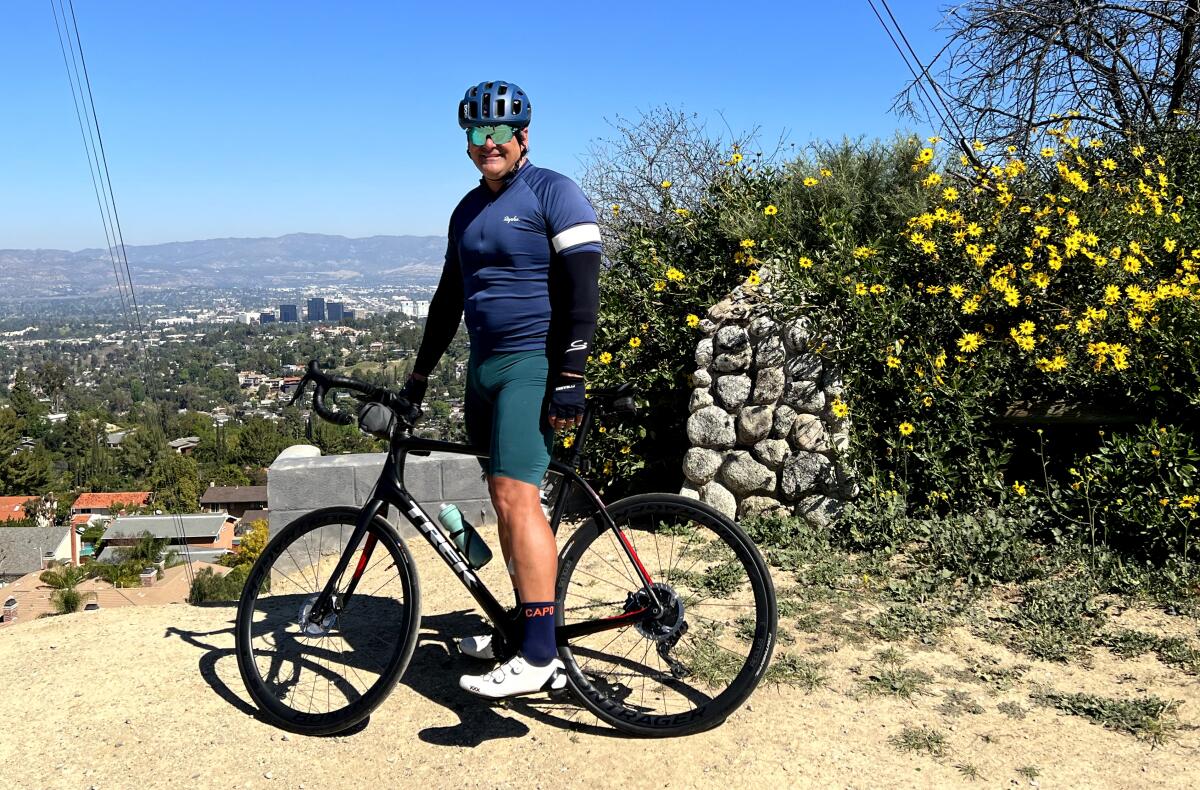
My family still feels the pain. I have a wife and two kids, and there are three cars in the family. We’re paying $300 to $400 a month on gasoline. Unfortunately, there’s a lot of driving going on here. These fuel prices are astronomical. I have the privilege of riding all around the city, from downtown L.A. to Montrose to Malibu, and I’ve never seen anything like this. I hate to say it, but we’re at everyone’s whim right now.
But we have to do something about it. A lot of people just don’t care. As long as they’re making their money, they don’t care if they are paying an extra $300 or $400 a month in gas. It doesn’t matter. It’s weird, and I think it’s because we live in Hollywood, and there’s so much money around here that the reaction is usually, “Yeah, whatever.”
We just switched to solar panels at our house, turning them on next week. We’ll have more energy than we need so we’ll be giving some back to the grid. We’re trying to do our part. Probably my next car will be a plug-in.
You know the slow parade of classic, souped-up lowrider cars with hydraulics that roll down the street bouncing to music? In Southern California, it’s a full-on family tradition that provided a much-needed distraction during the pandemic.
Eugene Hernandez, 63, retired LAUSD administrator, president of the lowrider Imperials Car Club. Transportation: 1976 Chevy Caprice Classic lowrider.
I’m remembering 1979, when there was a Middle East oil crisis. I could only buy gas on odd-numbered days of the month. People with license plates that ended in even numbers went on even days. Those lines at the gas stations were so long, so time-consuming, and sometimes the gas ran out before it was your turn. I was a junior college student living with my mom. I was driving a lowrider then, too, a green 1972 Chevy Caprice.
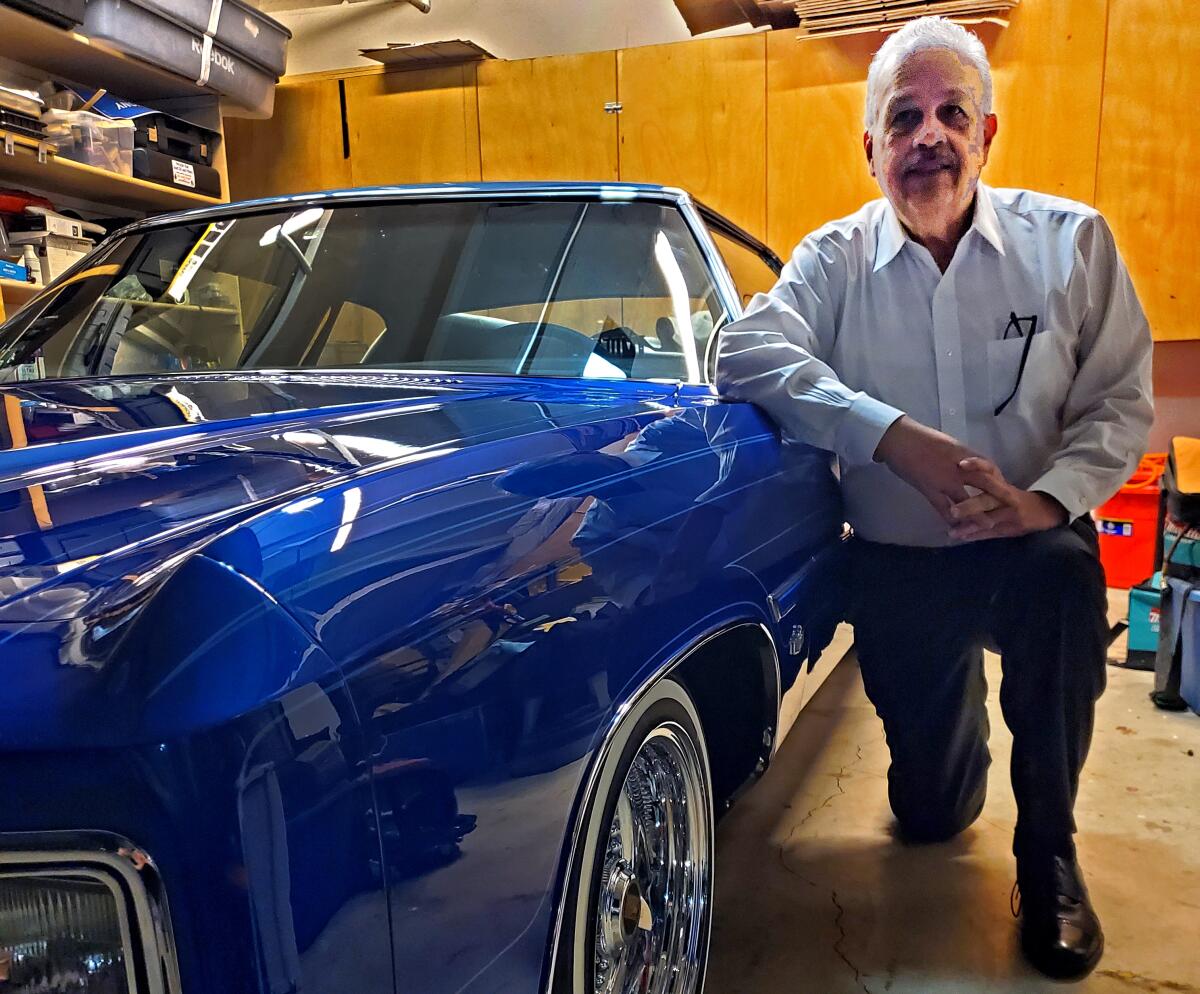
So, after that was over, all the politicians said, “We’re not going to allow this again. We are going to have energy independence.” So what happened? It’s 43 years later and the same stuff is happening again? And I think it’s worse now than it was then. This will be around a long time and I don’t know when it’s going to stop.
Drivers aren’t the only ones hurt by these prices. Think of all the classic car drivers and lowrider clubs. We get hit in two ways, with the gas for our cars and the diesel for the trucks we use to haul our cars to shows. Those costs are going to be through the roof. People are going to be looking at these costs and decide not to come out. There will be fewer people participating. That’s not good for a lot of reasons.
This is part of our culture, growing up in East Los Angeles. The Imperials Car Club has been around since 1965. We raise money for charities. We just did a Christmas car show where we gave over 500 toys for the LAPD Rampart Police Activities League. These shows are also benefits for toy drives and fundraisers. If this keeps up, people won’t be able to give as much. Being a lowrider isn’t just, “Hey, let’s just go cruise.” It’s about giving back to a community. These gas prices are just going to make that harder to do.
Banning Russian oil will affect West Coast gasoline prices more than those in other parts of the country because the West Coast uses more Russian oil.
Aiden Preuss, 17, is a Taft High School junior and traveling baseball pitcher. He also works as a host at a California Pizza Kitchen. Transportation: 2021 Kia Forte.
As a host, I don’t make what the servers do, so I really have to use my money from work carefully on gas. And with the gas prices going up, I can’t really find the money for going out with friends and getting dinner. Before the escalation of the prices, yeah, I could go out and get some In-N-Out with the buddies, but now I find it very difficult. So that’s pretty much the stress it has on me. Every paycheck goes right to gas. And I’m using some of what I made from the summer and other things to keep up. I’ve only asked my parents for help with gas money once.

Now that the season has started for baseball, I drive pretty much all over — downtown, places like Marshall High School and Wilson High. I would say maybe 100 or a little over 100 miles a week, just from baseball. But with work, too, and school, it can be close to 200 miles a week. I’m also on a team called the California Bucs, a kind of showcase team to put us in a position to be seen by coaches and scouts to try to play beyond high school.
I’m also paying for my own car. I’m trying hard to be independent. These fuel prices are definitely blood boiling. It troubles me. It was a little anxious seeing the high prices. And knowing that it’s not going to go down anytime soon, it’s a little overwhelming. But I’m hopeful for the future and being able to spend money on things I actually like. I just have to stay home sometimes and not eat out.
Russia’s invasion is yet another reason to switch from fossil fuels to clean energy, experts say.
Eric Wilson, 42, is a teacher, sustainability advocate and children’s book author. Transportation: Chevy Bolt EV.
Part of my duties at my school is being the sustainability coordinator. So part of getting the Bolt was walking the talk, showing I mean what I say by doing it myself. This was last March, before gas prices got too crazy, but being able to drive an EV is really important.
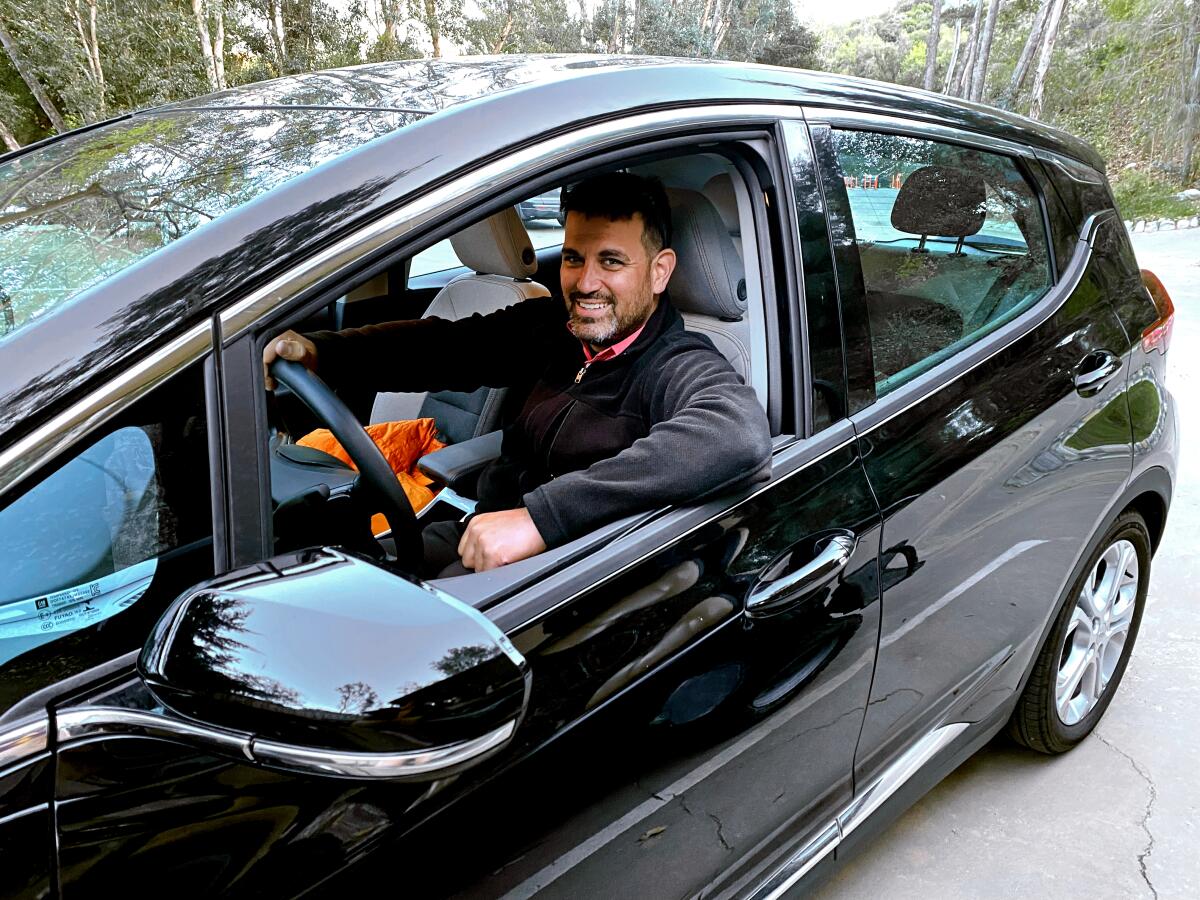
There’s still not as much information and knowledge out there, unfortunately. So I think that’s where things need to change, and whatever I can do to help expedite that process, just with being a schoolteacher and teaching about these concepts, I’m just trying to get that information out there so that people are aware of their choices. I wrote a children’s book called “The Family Car” where they switched to an electric car.
I think to some extent that these prices are the new normal. They will not be going away for a while. My first job out of college was at a boarding school in Austria, and it cost about the equivalent of $7 a gallon back then. And so it wasn’t too dissimilar to where we are now. I feel bad that people have been hit in the pocketbook. I was listening to a story this morning on NPR about diesel truck drivers. One woman paid over $1,100 to fill her rig, and that’s not sustainable economically or environmentally.
I’m not going to denigrate anyone who drives an internal combustion engine vehicle, although my son, Jonah, who is 9, already does. He’s a bit of a militant. He won’t ride in a car that has a gasoline-powered engine. I think he’s coming from a good place though.
More to Read
Inside the business of entertainment
The Wide Shot brings you news, analysis and insights on everything from streaming wars to production — and what it all means for the future.
You may occasionally receive promotional content from the Los Angeles Times.
